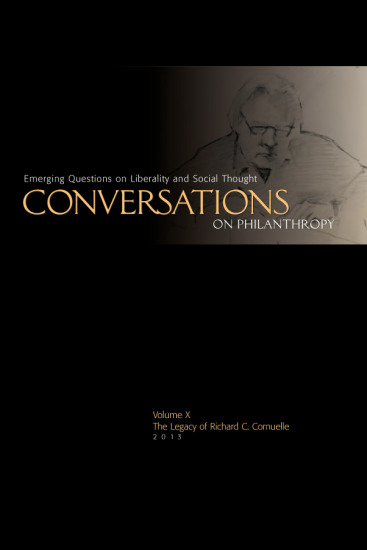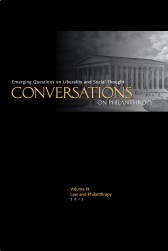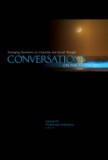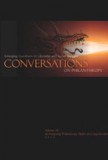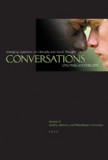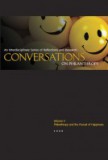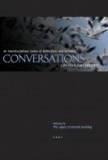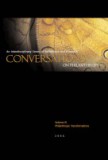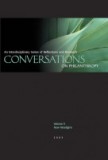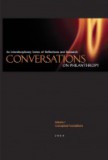Interested in learning more? Subscribe to our mailing list.
Conversations on Philanthropy is an annual publication of The Philanthropic Enterprise. Seeking to ignite reflection and discussion on the role of beneficence in the social order, Conversations features academic papers, essays, and reviews by scholars, philanthropists, and social entrepreneurs

Volume VII
Re-imagining Philanthropy: Myths and Opportunities, 2010
Download the entire journal as a PDF ![]()
HERE BE DRAGONS. Marking terra incognita as well as invoking human imagination, the dragon is a universal motif in human literature. As William Jackson observes in this volume, dragons present us a powerful and universal archetype that “carry associations of transcendent energy, wealth, wisdom and awe,” such associations that some might also make when regarding philanthropists. Here we seek not to make philanthropists out to be such dragons, but rather to encourage those who practice and study philanthropy to attend to the many species of dragon that surround the art. As J.R.R. Tolkien put it in The Hobbit, “[i]t does not do to leave a live dragon out of your calculations, if you live near him” (1937, 229). Read More...
ROBERT F. GARNETT, JR. is Associate Professor of Economics at Texas Christian University. His work in the philosophy, history, and pedagogy of economics has appeared in the Review of Austrian Economics, Review of Radical Political Economics, International Review of Economic Education, Review of Social Economy, Studies in Philosophy and Education, International Journal of Pluralism and Economics Education, Journal of Markets and Morality, Review of Political Economy, Journal of Economic Issues, Atlantic Economic Journal, and Rethinking Marxism. His current research examines the goals and methods of liberal learning in undergraduate economic education, the virtues of pluralism in economic inquiry, and the relationship between commercial and philanthropic forms of economic cooperation. He is also a contributing editor to Conversations on Philanthropy.
STEVEN GROSBY is professor of religion at Clemson University. His recent books includeNationalism: A Very Short Introduction (Oxford, 2005) and, as editor, Edward Shils, A Fragment of a Sociological Autobiography (Transaction, 2006). He is also a contributing editor toConversations on Philanthropy.
RICHARD GUNDERMAN majored in biology and philosophy at Wabash College, then received his PhD (from the Committee on Social Thought) and MD as a member of the Medical Scientist Training Program at the University of Chicago. He is currently Professor of Radiology, Pediatrics, Medical Education, Philosophy, Liberal Arts, Philanthropy, and in the Honors College at Indiana University, where he is also Vice Chair of Radiology. The recipient of a record number of Trustees Teaching Awards at Indiana University and numerous prizes for scholarship and writing, he is the author of eight books and over 275 scholarly articles. Dr. Gunderman is a contributing editor to Conversations on Philanthropy.
HEATHER WOOD ION is a chief executive and cultural anthropologist who specializes in turning around troubled organizations. Her doctoral research on social and cultural recovery from disasters has been applied to assist communities and corporations all over the world. She has turned around communities locked in adversarial paralysis, social service agencies, corporations that have lost their mission, and start-ups unable to cope with growth. For the last seven years of his life, Jonas Salk, MD, relied on Heather Ion as his editor, sounding board and collaborator on issues of international health policy, and in establishing the science of hope. Dr. Ion’s book, Third-class Ticket, has been translated into Italian, Hindi, Japanese, and Chinese, and is currently being made into a feature film. Another book, with Saul Levine MD, Against Terrible Odds, applies her knowledge of social and cultural recovery to the profound issues of individual resilience. Dr. Ion has served on numerous boards and national initiatives, including The Valeo Initiative, in collaboration with the Center for Healthcare Improvement and the Veterans’ Health Administration. She currently serves with Athena Charitable Trust, is Founder of the nonprofit Epidemic of Health and is a contributing editor to Conversations on Philanthropy.
WILLIAM J. JACKSON is Professor Emeritus at IUPUI, where he taught courses in Comparative Religion in the Department of Religious Studies for 25 years. He served as the first Lake Scholar at the Lake Family Institute on Faith and Giving, Philanthropic Studies Center, IUPUI, and published The Wisdom of Generosity: A Reader in American Philanthropy (2008). He has published several books about South Indian religious culture, and a book entitledHeaven's Fractal Net: Retrieving Lost Visions in the Humanities (2008), about fractal-like geometrical patterns found in the world's cultures. He is currently working on a book exploring the "cultural DNA of America," the deep stories, symbols, emblems, values and aspirations which have been formative and influential in American life.
GEORGE McCULLY served for twenty years as professor of European intellectual and cultural history, from the Renaissance to the Enlightenment, and for twenty-five years as a professional philanthropist—fundraiser, strategic planner, executive director, trustee, and advisor to charities, foundations, families and individual donors. In 1997 he created the highly respected and influential Massachusetts Catalogue for Philanthropy, to promote charitable giving and strengthen the culture of philanthropy through donor-education. His book, Philanthropy Reconsidered (2008) presents a comprehensive overview of the "vocabulary, conceptualization, and rhetoric" of philanthropy from the ancient coinage of the term in Prometheus Bound, to its essential role informing the American Revolution and Constitution, to the paradigm-shift transforming philanthropy today. His latest work is the Massachusetts Philanthropic Directory—an on-line, systematically taxonomized, analytical, Directory to all the philanthropic charities of (initially) Massachusetts, which comprise only 1/7th of the state's "nonprofits". This dramatically innovative Directory system will be extended nationwide over the next two years. He is also a contributing editor to Conversations on Philanthropy.
Symposium - Essays:
—Richard B. Gunderman
Just as there are many different ways to slice a loaf of bread, there are many different disciplinary lenses through which to examine philanthropy. We can choose between, among others, the perspectives of economics, politics, history, religion, ethics, and rhetoric. In each case, the particular perspective from which we examine philanthropy helps to clarify some of its features but obscures others. Economics, for example, illuminates philanthropic activity as transfers of wealth, examining the parties between whom such transfers take place, the financial media employed, and the effect of various financial incentives and disincentives on the amount of giving that takes place. However, as Kenneth Boulding has pointed out, a purely economic approach draws attention away from other forms of giving, such as voluntary service, that do not involve wealth transfers and may prove difficult or impossible to value in monetary terms (1973). By contrast, a rhetorical lens sheds light on the types and relative effectiveness of different appeals for aid, while offering little or no insight on their economic implications. Analogous observations apply to other disciplinary perspectives. Read More...
—Steven Grosby
The mildest and at the same time most widespread form of betrayal (as a form of existence) was not to do anything bad directly, but just not to notice the doomed person next to one, not to help him, to turn away one’s face, to shrink back.
Aleksandr Solzhenitsyn, The Gulag Archipelago
Introduction
There are widely-held beliefs about human conduct and organization that unfortunately inhibit our ability to imagine new forms of personal and social well-being. Some of these beliefs are well known, for example, the view that because of the size and complexity of modern society, only the state is able to marshal the resources required to address any number of perceived deficiencies. Putting aside both the epistemological problem of how any centralized authority could obtain sufficient knowledge to address enormously complex problems and the wealth of evidence of inefficient bureaucratism when it attempts to do so, the practical consequences of this belief can only be to undermine individual initiative. When individual initiative is, at best, discouraged as a consequence of such a belief, the character of the individual is warped by enervating the willingness of the individual to undertake action that concretely expresses his or her sympathy for another. Furthermore, to render individual initiative inactive can only undermine what Richard Cornuelle (1993 [1965]) designated the “independent sector” that is so necessary for the civil engagement of a society of free individuals. Thus, different, usually unpredictable possibilities for self-organization with new, often emerging aims are foreclosed. Read More...
—William J. Jackson
My professional training in the history of religion/comparative study of religion has conditioned me to associate the English word “myth” with the Greek word “mythos,” used to describe sacred stories of origins, archetypes, not wrongheaded misconceptions. But in considering the themes of philanthropy it is interesting to use the term “myth” as it is used colloquially—to mean “an error needing to be debunked,” even if at times it may lead to starker contrasts than I usually arrive at. So in this article I will suspend my usual attempts to get people to think of myths as profoundly true symbolic stories. Instead, for once in my life, I will join the large majority of people who use the word colloquially and pejoratively, to see where it takes me. The seven questionable issues I will discuss in this paper have struck me in recent years as especially fruitful to explore. Read More...
—George McCully
I would propose for our discussion two myths—one that we have and should do without, the other we have lost and should now revive. Needless to say, these are two different kinds of “myths.”
The first is a “myth” defined in this assignment as a “widely-held but false notion that inhibits our imagination and pursuit of new forms of personal and social well-being.” I would propose for this the false myth that the term “nonprofit” is synonymous with, or bears any significant relation to, philanthropy.
The second is a “myth” in the dictionary sense: “a traditional story, esp. one concerning the early history of a … natural or social phenomenon....” I would propose for this the Classical Greek myth of Prometheus, as first told in Prometheus Bound, long attributed to Aeschylus, in which (line 11) the word and concept philanthropos (“philanthropic”) was apparently coined. As the archetype of authentic philanthropy down through the ages, this myth is well qualified to inspire and nourish our current and future “imagination and pursuit of new forms of personal and social well-being.” In its context, the absurdity of “nonprofit” as describing philanthropy is fully illuminated. Read More...
—Robert F. Garnett, Jr.
Ealy and Ealy detail the ways in which twentieth-century philanthropy was inspired by the Progressivist Era’s distinctive “faith in the power of reason and an equally strong faith in science and technical expertise”. One anchor of the Progressivist faith was the myth of the state as an efficient organ of social engineering, a “centralized, rationalized, professional administration of civil servants” (2006, 36). This view of the state as a machine-like system, capable of dispensing resources in a fair and efficient manner, was mirrored in the heroic self-image of large philanthropic foundations who sought to employ modern social science to cure entrenched societal problems. As governments and foundations came to be regarded as efficient alternatives to direct citizen action, energy and responsibility flowed “away from more primary, local, and voluntary institutions to those more centralized, professionalized, and tax-supported” 35). Read More...
Richard Gunderman cautions us that “Myth concerns the foundations of our worldview, and thus cannot be encompassed by any particular discipline” (2). While he and other authors explore the many taxonomies that are and can be applied to the study of philanthropy, Gunderman alone reminds us that “treating cherished myths as objects of intellectual analysis may leech away some of their power to transform our lives” (9). In his examination of Joseph Campbell’s four dimensions of myth, Gunderman asks Why does Philanthropy exist? And then goes beyond Campbell’s dimensions of myth to point out that myths constrain us, liberate and inspire us, and open possibilities that might otherwise remain hidden. If, as Gunderman has written elsewhere, philanthropy is a calling, can we understand that calling without its mythic dimension? Read More...
Book Reviews: 
Reviewed by Claire Morgan
I do not understand the point of this book. I understand the stated point—to try to understand what kindness is and why we should care about it—but I’m not convinced that this is what it is really about. After having spent a couple of hours reading the book and thinking about it, I don’t believe I am any the wiser about what kindness is and why it’s important. Rather, I have the impression that Phillips and Taylor approach their subject with a reasonably strong worldview—a kind of social and psychological communitarianism—that they want to promote. They seem to be attempting to (re)interpret this worldview in a fairly forced (and not very instructive) way, to jump on the trendy happiness studies bandwagon, claim a crisis, and trot out some old tropes about compassion, social cohesion, and our innate inter-dependency. Phillips and Taylor seem to hope that earnest, well-meaning, thoughtful readers of the general public who want to know more about kindness won’t even notice their approach. Their occasional references to stalwarts like the Stoics and Hume seem primarily camouflage for the real stars of the drama, Rousseau and Freud. Read More...
Reviewed by Heather Wood Ion
This book is a polemic. It is witty, provocative, and brave enough to address some of the fundamental problems we face. No thoughtful person would argue with the author that there are major problems in our criminal justice system, our social services, public education, and public health and in the ways we address these issues. Read More...
Reviewed by Max Borders
Ronald Coase's seminal 1937 work The Nature of the Firm poses an important question: why do folks organize into firms? Why isn't there a totally "free" market in labor? Or more prosaically, why do organizations take on scales that result in relatively costly, hierarchical forms of order? Coase's answer is "transaction costs." The firm reduces the costs that would be incurred to continually coordinate actions among scattered people with disparate skill sets—all of whom would have to contract with one another and hammer out details of said contracts and then get themselves together somehow to divide labor and accomplish something profitable. So, up to a certain point, firms (or organizations) arranged like hierarchies have been less costly to organize because it is usually cheaper for some people to give orders and some to take them (the former pay the latter for the privilege). But that is changing—and fast. Read More...
Reviewed by Gus DiZerega
Dwight Murphey’s A ‘Shared Market Economy’: A Classical Liberal Rethinks the Market System is one of the most important contemporary efforts to re-think the nature of classical liberal social thought. We are fortunate that he has published it as an open source online book, http://www.dwightmurphey-collectedwritings.info/SME-TofC.htm. A life-long classical liberal, from his student days when he studied under Ludwig von Mises, throughout his career teaching business law until his retirement in 2003 and since, Murphey has published a number of books on these themes. Recently he has pondered the strengths and weaknesses of the classical liberal paradigm for understanding society during a time when it seems powerfully rebutted by the events of the past decade or so. Read More...
Reviewed by Christopher Coyne
How do ordinary people deal with a predatory state? Finding an answer to this question is at the center of James Scott’s insightful The Art of Not Being Governed. Scott’s analysis focuses on the various groups residing in the hills of Zomia—a mountainous region in Southeast Asia comprised of parts of Burma, Cambodia, China, India, Laos, Vietnam, and Thailand. His focus on Zomia is driven by the fact that the region is the largest remaining area that has not been integrated into a nation state. Indeed, for over two thousand years, the people living in the highlands of Zomia have lived outside the reach of the lowland government. The standard view of these “hill people” is that they are remnants of the pre-state period and represent a primitive form of living. In contrast, those that have moved into the lowlands and become part of the state system have progressed and become civilized. Although Scott is focused on Zomia, it should be noted that governments and those involved in international development efforts tend to hold a similar view towards those living outside the reach of the state in other settings as well. Indeed, this view underpins the efforts to ‘fix’ the various institutions (economic, legal, political, and social) in societies around the world in the hope of bringing modernity to people who are viewed as primitive. Read More...
Reviewed by Jack Sommer
Modern philanthropy has been deeply shaped by the scientific worldview; thus a book that helps us understand better the relationship of science to political order should be of significant interest to philanthropists. There is much to commend in Timothy Ferris’s new book, not the least of which is his enthusiastic engagement with a subject of immense scope and complexity Moreover, he brings a refreshing understanding of intellectual history that is stoutly informed by classical liberal thought and the history of science and technology. Ferris writes with the smooth confidence of a seasoned professional. The result is a selective tour across the past four hundred years of the co-development of liberal democratic institutions and the tangled nexus of science and technology. This entire traverse is peppered with generally engaging if sometimes distracting ‘side bars’ on the personal lives and peccadilloes of the great and powerful. I say “distracting” not because they fail to amuse (they do) but because I find them to be digressions from the aims of the book that left me feeling that I was rambling about rather than being guided by an accurate compass. Read More...
Reviewed by Thomas K. Park
Hurricane Katrina has the special distinction of both having caused stupendous physical, social and financial damage and of having initially had one of the most incompetent natural disaster responses in US history. Importantly, unlike the recent BP oil spill, the general expectation was that Uncle Sam should shoulder the burden of the response. This makes The Cultural and Political Economy of Recovery by an advocate of the Austrian economic tradition (epitomized by the work of Mises and Hayek) particularly significant: obviously big government will not be claimed to be the main answer in the Katrina case and yet, empirically speaking, any reader will hope to be dissuaded of this in a way that disentangles extreme government incompetence in this case from the theoretically possible response that a competent government might have provided. In short, Emily Chamlee-Wright has taken on the case to provide an alternative to big government in disaster relief but has both an empirical and a theoretical task to complete. Read More...
Reviewed by Martin Morse Wooster
Most people know that the Salvation Army is a highly effective poverty-fighting nonprofit. A few people have seen George Bernard Shaw’s Major Barbara and realize that the Army is also an evangelical church. But in its 145-year history, the Salvation Army has developed many quirks and traditions that need to be understood if we are to know why it’s so successful at its charitable activities. Read More...
Reviewed by S. T. Karnick
The current national debate over the role of government has critical implications for philanthropy, as the answer will determine whether the melioration of social ills will be pursued primarily through voluntary associations and actions or by the state through the political process. As the debate over the health-care reform bill demonstrated, government programs to bring about equality among the citizenry cannot work if people can opt out, and thus any potential challenge to government’s hegemony must be forcefully rejected. That, of course, shrinks the space for all forms of voluntary action. Read More...
Reviewed by T. Clark Durant
Douglas Rushkoff begins Life Inc. by recounting the story of how he was mugged at gunpoint on Christmas Eve in his Park Slope, Brooklyn neighborhood. Later that night, after posting news of the crime on the Park Slope Parent’s list, he is shocked to find that both of the first two people who respond choose—not to sympathize—but to chastise him for mentioning the street where the crime took place, a mention they fear will hurt their property values. Their lack of sympathy jolts Rushkoff into reflection upon man’s inhumanity to man, especially, he suspects, when money, markets, or corporations are involved. In large part, the remaining 250 pages of the book are a variation on this theme. Read More...

